Campaign Tracker: What you need to know about the Kenya elections as at June 8
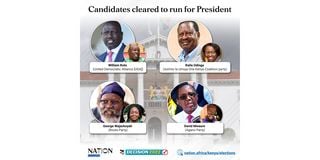
Whatever you decide to say during campaigns, just do not mention mitumba (second-hand clothes) adversely, otherwise you will feel the wrath of Kenyans, and one presidential aspirant now knows why the “scared mitumba” is to be left alone.
So serious is it that it kept Kenyans on edge for a full day!
Then, a gubernatorial candidate stormed the electoral commission's offices in Mombasa. He wanted to be cleared on the spot even when he could see that this was not going to happen. And in another part of the country, two governor aspirants initially locked out of the race were given a new lifeline.
The campaign tracker explains all these details to you. Here is all you need to know about Kenya’s politics as at June 8.
1. Mitumba, the dead, and the politics of clothes
Azimio la Umoja One Kenya Coalition Party presidential candidate Raila Odinga was forced to explain himself over remarks he had made during the launch of the outfit’s manifesto on how he would deal with mitumba if he is elected President.
Mr Odinga sought to fight back criticism from opponents who accused him of insensitivity when he, on Monday night, dismissed mitumba as “clothes from dead people”. In his speech, he said he would protect mitumba traders by ensuring that they get the first opportunity to market locally made clothes.
This statement sparked a sustained backlash from his opponents in Deputy President William Ruto’s camp over the comments he made during the launch of his manifesto, which champions the revival of the local textile industry.
“Our people are only wearing clothes coming from outside the country which have been worn by people who are dead. We are going to go to primary production so that our people who are importing mitumba can have good products to sell here,” Mr Odinga said at the Nyayo National Stadium.
Mr Odinga had, however, indicated that his proposal would not affect mitumba traders through job losses.
Reiterating his plans to promote Kenya’s textile industry yesterday, Mr Odinga said he appreciated that the mitumba trade is popular globally and supports the livelihoods of many small-scale traders.
“We are going to go into primary production as we also promote other products. We are going to grow cotton, we do the ginning, the spinning, the weaving until we end up with fabrics. Then we can embark on secondary manufacturing of dresses, suits and so on,” he told members of the Kenya National Chamber of Commerce and Industry (KNCCI) at the Hilton Hotel in Nairobi.
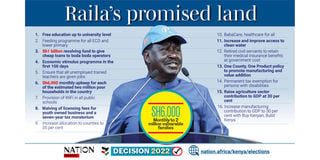
2. Sonko in Trouble, again!
The Kenya School of Government in Mombasa yesterday evening became a theatre of an hours-long standoff between the electoral commission and Wiper governor aspirant Mike Sonko over his clearance.
Mr Sonko’s plans to run for governor of the second-largest city in the country fell apart after IEBC officials said they had not received communication from a court that had lifted earlier orders restraining the agency from blocking his bid.
Mr Sonko and his legal team, led by lawyer Titus Kirui, pushed Mombasa Returning Officer Swalhah Yusuf to clear him. It was not until at 4.45pm that Ms Yusuf received the order from the Supreme Court, informing her that Mr Sonko had a pending case, but she maintained it was past working hours.
Thirty-five minutes later, journalists and supporters of the aspirant were ejected from the IEBC room as officials consulted further with their seniors.
Mr Sonko was accompanied by his running mate, Kisauni MP Ali Mbogo, and Kwale Wiper governor candidate Chirau Ali Mwakwere, among other aspirants. Police barred his supporters from entering the compound.
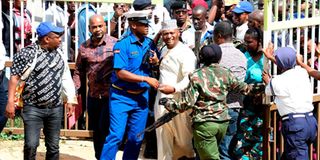
Former Nairobi Governor Mike Sonko (far left) during his chaotic entry to the IEBC Clearance Office at the Kenya School of Government in Mombasa on June 6, 2022.
3. Governor Njuki cleared to vie for reelection days after his running mate’s disqualification
The electoral agency has cleared Tharaka Nithi Governor Muthomi Njuki to seek reelection in the August 9 polls on a United Democratic Alliance (UDA) party ticket.
His reelection bid faced a hurdle after the IEBC last week disqualified his preferred running mate, Mr Njue Njagi, from Maara constituency, because he had not resigned from his job by the February 9 deadline, forcing the governor to go back to the drawing board.
Mr Njuki picked Muthambi Ward Representative Wilson Nyaga, who had lost in the UDA nominations.
Mr Njuki had to find a running mate after his deputy Nyamu Kagwima announced his bid to unseat him on a Wiper party ticket. Mr Kagwima has been cleared to run for the seat.
Mr Kagwima had said he could not seek reelection with his boss due to integrity issues.
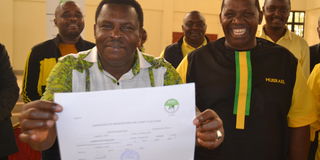
Tharaka Nithi Governor Muthomi Njuki displays Independent Electoral and Boundaries Commission clearance certificate to media at county headquarters Kathwana
4. IEBC opens dispute resolution doors to aggrieved aspirants
The IEBC will open a 10-day window beginning Thursday for aggrieved aspirants to lodge their complaints with the IEBC Dispute Resolution Committee.
Updating the nation, IEBC boss Wafula Chebukati added that the agency would begin preparing ballot papers in July in readiness for the August 9 polls.
This follows the close of clearance for candidates.
He said the law expects disputes to arise on decisions made by the electoral agency’s returning officers and the agency is ready to hear them.
However, since some aggrieved parties may want to proceed to the High Court, the commission is looking at two weeks for all the disputes to be determined.
“The nomination exercise will end on June 8 and then from June 9 the 10-day disputes window opens. Some individuals may want to go to court but come the end of this month, we shall be proceeding to prepare the ballot papers,” said Mr Chebukati.
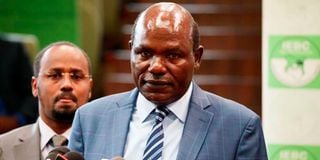
IEBC Chairman Wafula Chebukati who has said that impeached politicians will be barred from contesting in the August General Election. But those with pending criminal cases have been let off the hook.
5. Ekuru Aukot goes for Raila’s jugular
Thirdway Alliance party leader Dr Ekuru Aukot made another attempt to bar the Azimio la Umoja One Kenya presidential candidate, Mr Odinga, from contesting the country’s top seat.
In a June 5 letter to Mr Chebukati, Dr Aukot objected to the nomination of Mr Odinga on three grounds a day after the latter and his running mate, Martha Karua, were cleared to contest the presidency.
In his petition, Dr Aukot claims that Mr Odinga is not a member of the Azimio One Kenya party, which he claims is a corporate entity as envisaged by Section 12 of the Political Parties Act, 2011.
The coalition comprises 26 parties, including the Orange Democratic Movement (ODM), Jubilee, Kanu and Wiper.
Dr Aukot argues that because 100 per cent of the membership of Azimio are political parties, this bars the outfit from fielding a presidential candidate for an election.
“The members of this coalition political party are corporate entities and not citizens of Kenya. Corporate entities such as [the] membership of Azimio have no constitutional right to vote or even be entered into the register of voters,” said Dr Aukot.
He insisted that if Azimio was to field a candidate, it has to be one of its corporate entities which itself he feels is a misnomer and unknown to the law.
If the IEBC refuses to revoke the nomination of Mr Odinga and Ms Karua and later gazettes them as candidates, Dr Aukot has threatened to go to court to quash what he termed an ‘illegal’ decision by the commission.
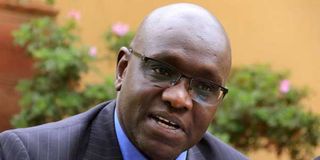
Ekuru Aukot during press conference in Nairobi on July 5, 2017.
6. Kenya to have the lowest number of presidential candidates since multiparty era began 1992
Kenya will have the lowest number of presidential candidates —four — since the advent of multiparty democracy in 1992.
This is after the electoral commission knocked out more than 50 aspirants from the race.
The IEBC yesterday ended the final stage of clearing presidential aspirants for the August 9 elections. Only four hopefuls passed the test out of 18 aspirants shortlisted, down from 54 who had expressed interest in the State House job.
The four are Kenya Kwanza’s candidate, DP Ruto, Azimio’s Mr Odinga, Roots Party leader George Wajackoyah and Agano Party's David Mwaure Waihiga.
In the 2017 elections, Kenya had eight candidates, the same number that were on the ballot in 2013. In 1997, there were 15 candidates, up from eight in 1992, when Kenya held its first multiparty elections.
There were five candidates in 2002, before the number climbed to nine in 2007.

7. Senator Sakaja cleared for Nairobi governor’s race
The electoral commission on Tuesday cleared Senator Johnson Sakaja and his running mate Njoroge Muchiri to contest in the Nairobi governor’s race.
Mr Sakaja, who is finishing his first term as senator after serving one term as a nominated MP, will vie on a UDA ticket.

Nairobi Senator Johnson Sakaja.
8. Irungu Kang’ata back in Muranga’s governor race after slight “hitch”
Shouts of “si uchawi, ni maombi” rent the air in Mukuyu town shortly after the IEBC cleared Muranga’s Senator Irungu Kang’ata to vie for governor.
This was after the legislator’s registration had been suspended on Monday on the grounds that his running mate, Dr Winfred Mwangi, had not resigned before the legal deadline to be allowed to contest.
When she was picked as Dr Kang'ata's running mate, Dr Mwangi, a land economist, was a senior lecturer in the Department of Real Estate and Construction Management at the University of Nairobi.
According to a statement from the IEBC’s Murang’a County Elections Manager Saumu Omar Chirchir, the issue arose after Dr Kanga’ta’s running mate failed to provide sufficient proof that she had resigned from employment as stipulated by the electoral law.
Yesterday, Dr Kang'ata returned to the IEBC with Dr Mwangi armed with evidence that she had resigned on February 7, two days before the February 9 deadline.
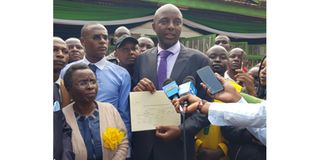
UDA Murang'a county gubernatorial aspirant Irungu Kang'ata and his former running mate Dr. Winnie Mwangi after being cleared by IEBC.





